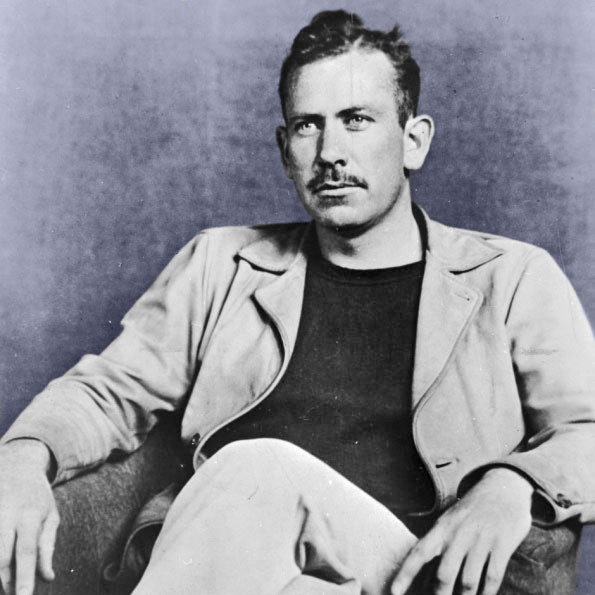
On January 29, 1951, John Steinbeck began East of Eden, a novel that he considered his magnum opus and the crowning achievement of his literary career. From the date of this letter until the novel’s completion in November, Steinbeck kept a meticulous ledger—in the form of a large blue notebook—which he filled with a series of letters to his editor and confidante, Pascal Covici, written every morning before he began work on the book. Covici was a prominent Romanian-American writer, editor, and publisher who, after discovering the likes of Nathanael West, John Fante, Wyndham Lewis, and Steinbeck (and issuing their early works under his Pascal Covici, Inc imprint), became a major creative force at Viking Press in New York. Steinbeck’s East of Eden letters are equal parts memoir and personal correspondence, offering meditations on the writing process, as well as on his interest in fatherhood, politics, and spirituality. After the novel’s completion, he gifted the notebook—with the letters on the left page and the manuscript itself on the right—to Covici and his wife. The letters are unique literary artifacts, written as much to himself as to their ostensible recipient. They chart Steinbeck’s approach to plotting, outlining, and working through the complexities of theme, style, and structure that the ambitious East of Eden attempted to address. The novel, published in 1952, was dedicated to Covici.
August 20, 1951
Pacific Grove, CA
Well I did what I intended. I took the whole week off and I succeeded for a couple of days in putting the whole book out of my mind. I don’t know whether or not I was right. Only the next few weeks will tell. But it seemed to me that I needed it and so I took it. Now I am ready to go on with the last book and the only break will be the time when we move back to New York. And since that will be on a Sunday, it is probably that I may not lose any working time at all. Our reservation on the boat is for the morning of Sept. 16. And I have several weeks before then.
I still think it good to treat this last book as a unit even to pagination. However, we will have to see about that. The book will take its own pace, as I have said so often. We will see.
Naturally, having lost the rhythmic discipline, I shall be in trouble for the first day or two but that will be all right too. How the mind rebels against work, but once working, it rebels just as harshly against stopping. I don’t know why this should be. It’s a dumb brute, the human mind. And it has really brutish tendencies.
I am going to open this book with a kind of a refrain. You will recognize it with the second line I think. And I know it is proper for design. It is the recapitulation of intention. And I do know that just before your final stream—one should pause to re-restablish what the pattern was in the mind of the reader. And this is what I intend to do or try to.
My mind is letting in all kinds of side things from the world of my life. That is how quickly discipline is lost. It happens very soon. And I must shake my spirit like a rag. And I will.
I am thinking about Tom. We, and particularly Elaine, have done good things for him this summer but there is much more to do—much more. And we will try our best to work out what we can.
Now—I am going to wipe out the world of my life and get into the opening of the last of the book. And for this purpose I am going to start on a fresh, free page.
There I have finished the opening of book 4. And it is a refrain of the opening of the century. And I have ranged the changeable with the continuing. Also I have set down some things which I believe and some things which have not been said for a long time and which should be said and must be said, particularly since they are true.
John
From Journal of a Novel: The East of Eden Letters by John Steinbeck. New York: Penguin, 1990. pp. 215-216.
FURTHER READING
Read East of Eden’s dedication to Covici, which sheds light on the depth and breadth of Steinbeck’s and Covici’s friendship.
Read a brief bio-critical essay on Covici that touches on his friendship with Steinbeck, the publication of East of Eden, and more.
Explore the historical circumstances in California that galvanize Steinbeck’s East of Eden.


